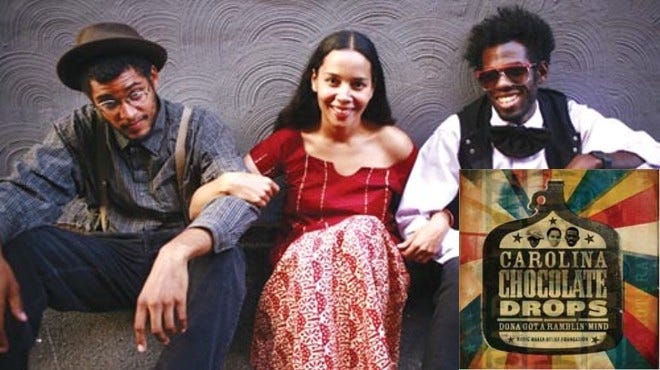The late Aunt Jennie Wilson, who was born in 1900 in Logan County, WV, learned tunes from family members and other musicians in her coalfield community and was among the first women in her region to play the banjo.
Our dear friend Dave Peyton — who is much on our minds, since today is the second anniversary of his death — got to know Jennie in the 1960s and learned a number of her songs, many of which he taught The Flood over the years. One of our all-time favorites is “Georgie Buck,” Jennie’s old play-party tune that has been in our repertoire for about 20 years now. Below is a 2008 video that Pamela Bowen shot of David leading us on it, with solos by Doug Chaffin, Joe Dobbs and Sam St. Clair.
But with the song comes a mystery. After a few decades of thinking this relatively obscure tune was a classic West Virginia folk song, Dave was astounded to find it on the 2006 debut album by The Carolina Chocolate Drops, who reported that they learned it from African-American string band fiddler Joe Thompson.
Researching further, Peyton learned that the song actually was heard in many parts of the South, but was relatively rare. So, how in the world, he wondered, did a tune that experts today characterize as “a black Southern banjo song” find its way to the ears of a young white girl on the banks of the Guyandotte River at the start of the 20th century?
Jennie Wilson couldn’t be asked — by the time of The Chocolate Drops released their debut Dona Got a Ramblin’ Mind album, Aunt Jennie had been dead for 14 years — but a veteran reporter like Peyton was undeterred. Talking about it with Appalachian culture authorities, David came up with a theory. Jennie — who started playing square dances and parties when still a teen-ager — probably learned the song from African American musicians who came through Logan County in the 1920s to work on the railroad and/or in the coal mines. Nowadays it is well-documented that some mountain music and dance were influenced by black traditions of rhythmic dance and songs.
The Elizabeth Cotton Connection
“Georgie Buck” also was in the repertoire of Chapel Hill, NC, guitarist and banjo player Elizabeth Cotten who, at 67, taught the same song to a 19-year-old Taj Mahal.
The blues and roots music connoisseur was still thinking of the song 40 years later when he recorded his 1999 Kulanjan album. During the recording session, Taj played it to the Malian musicians who were recording with him; then when he put down his guitar, they started to play their own version based around a 6-string hunter’s harp called a “kamale ngoni.”
This may be as close as one gets to how the blues once sounded long before even the wax-cylinder recordings at the turn of the century, Taj said, adding, after the last notes faded, “That’s five centuries there; the music just went around in a big ring.”
Our Take on the Tune
Meanwhile, Brother Peyton always loved it when his Flood family gave a new spin to old songs, but even he probably couldn’t have imagined our 2022 take on this tune.
Just picture Dave grinning to hear Veezy’s rollicking sax backed by Charlie’s new banjo. To hear our current version of the tune, click here.
Everything old is new again, and while the lyrics might say that “Georgie Buck is dead,” his song seems to be more alive than ever.


















Share this post